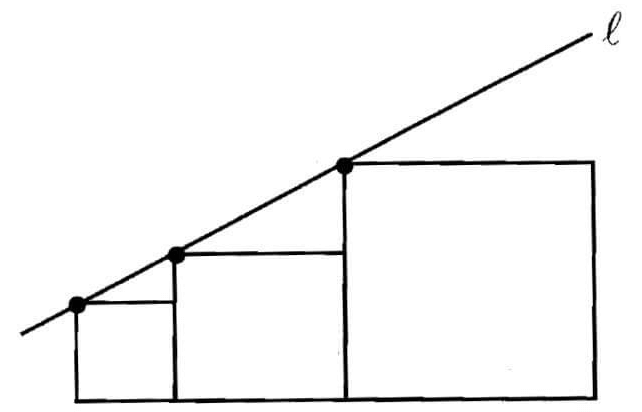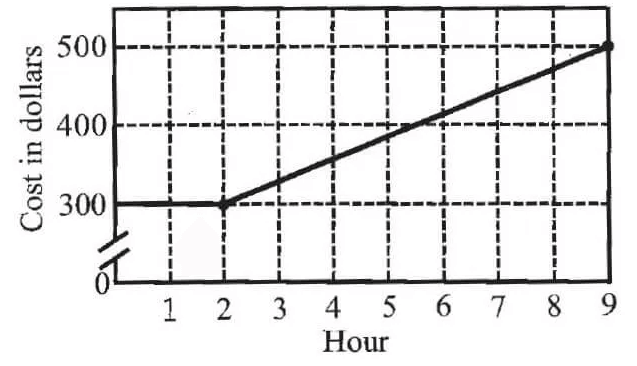MAXIMUM OR MINIMUM VALUE OF A QUADRATIC FUNCTION
We can determine the maxim or minimum value of the quadratic function using the vertex of the parabola (graph the quadratic function).
The general form of a quadratic function is
f(x) = ax2 + bx + c
Here, if the leading coefficient or the sign of "a" is positive, then the graph of the quadratic function will be a parabola which opens up.
If the leading coefficient or the sign of "a" is negative, then the graph of the quadratic function will be a parabola which opens down.
Maximum Value of a Quadratic Function
The quadratic function f(x) = ax2 + bx + c will have only the maximum value when the the leading coefficient or the sign of "a" is negative.
When "a" is negative the graph of the quadratic function will be a parabola which opens down.
The maximum value is "y" coordinate at the vertex of the parabola.
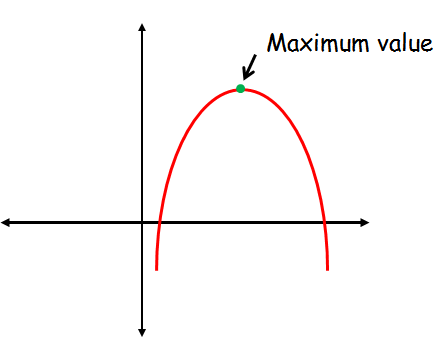
Note :
There is no minimum value for the parabola which opens down.
Minimum Value of a Quadratic Function
The quadratic function f(x) = ax2 + bx + c will have only the minimum value when the the leading coefficient or the sign of "a" is positive.
When "a" is positive, the graph of the quadratic function will be a parabola which opens up.
The minimum value is "y" coordinate at the vertex of the parabola.
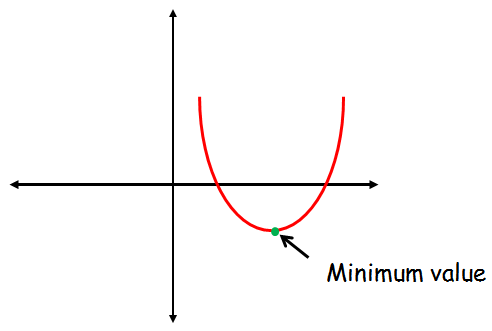
Note :
There is no maximum value for the parabola which opens up.
Vertex of a Parabola
To find the vertex of the parabola which is given by the quadratic function
f(x) = ax2 + bx + c,
we have to substitute
x = -b/2a
And the vertex is
[-b/2a, f(-b/2a)]
So, the maximum or minimum value of the quadratic function is,
"y" coordinate = f(-b/2a)
Examples
Example 1 :
Find the minimum or maximum value of the quadratic equation given below.
f(x) = 2x2 + 7x + 5
Solution :
In the given quadratic function, since the leading coefficient (2x2) is positive, the function will have only the minimum value.
When we compare the given quadratic function with
f(x) = ax2 + bx + c,
we get
a = 2
b = 7
c = 5
"x" coordinate of the vertex = -b/2a
"x" coordinate of the vertex = -7/2(2)
"x" coordinate of the vertex = -7/4
"x" coordinate of the vertex = -1.75
Minimum value is
= f(-1.75)
= 2(-1.75)2 + 7(-1.75) + 5
= 2(3.0625) - 12.25 + 5
= 6.125 - 12.25 + 5
= -1.125
So, the minimum value of the given quadratic function is -1.125.
Example 2 :
A golfer attempts to hit a golf ball over a gorge from a platform above the ground. The function that models the height of the ball is
h(t) = -5t2 + 40t + 100
where 'h' is the height in meters 't' is time in seconds after contact. Find the maximum height reached by the golf ball.
Solution :
It is clear that the path of the golf ball is a parabola which opens up.
It has been illustrated in the picture given below.
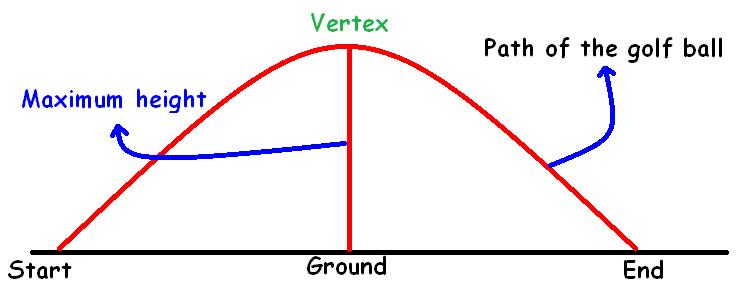
When we compare the given quadratic function with
f(x) = ax2 + bx + c,
we get
a = -5
b = 40
c = 100
"x" coordinate of the vertex = -b / 2a
"x" coordinate of the vertex = -40 / 2x(-5)
"x" coordinate of the vertex = -40 / (-10)
"x" coordinate of the vertex = 4
Maximum height is
= h(4)
= -5(4)2 + 40(4) + 100
= -5(16) + 160 + 100
= -80 + 160 + 100
= 180
So, the maximum height reached by the golf ball is 180 meters.
Kindly mail your feedback to v4formath@gmail.com
We always appreciate your feedback.
©All rights reserved. onlinemath4all.com
Recent Articles
-
Digital SAT Math Problems and Solutions (Part - 146)
Apr 18, 25 06:52 AM
Digital SAT Math Problems and Solutions (Part - 146) -
Logarithmic Derivative Problems and Solutions
Apr 16, 25 09:25 PM
Logarithmic Derivative Problems and Solutions -
Digital SAT Math Problems and Solutions (Part - 145)
Apr 16, 25 12:35 PM
Digital SAT Math Problems and Solutions (Part - 145)
